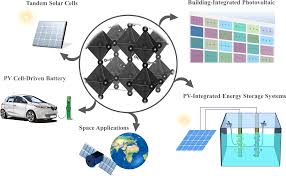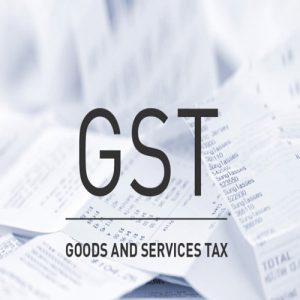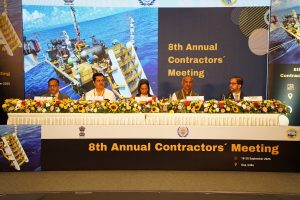Today’s Current Affairs:26th September 2025 for UPSC IAS exams, State PSC exams, SSC CGL, State SSC, RRB, Railways, Banking Exam & IBPS, etc
Table of Contents
Perovskite Solar Cells: New Study

Swedish scientists at Chalmers University of Technology have used AI-enhanced simulations to solve the long-standing puzzle of halide perovskite instability.
- A Perovskite Solar Cell (PSC) is a type of thin-film photovoltaic device that uses perovskite-structured compounds (ABX₃) as the light-absorbing active layer.
- Perovskite Material Named after the mineral Calcium Titanium Oxide (CaTiO₃).
- General chemical formula: ABX₃, where ‘A’ and ‘B’ are cations and ‘X’ is an anion.
- In solar tech, it usually refers to metal halide perovskites: hybrid organic–inorganic compounds with a metal cation (Pb²⁺, Sn²⁺), halide anion (I⁻, Br⁻, Cl⁻), and organic cation (methylammonium, formamidinium).
- Advantages:
- High power conversion efficiency (PCE) (over 25% in labs).
- Thin, lightweight, and flexible → can be applied on windows, buildings, smartphones, and vehicles.
- Low-cost fabrication compared to energy-intensive silicon processing.
- Potential use in tandem solar cells with silicon for even higher efficiency.
- Efficiency Potential: It is known for high light absorption, excellent charge transport, and bandgap tunability and also achieved power conversion efficiencies (PCEs) above 25%, comparable to silicon cells.
Central Board of Film Certification : In News

Multiple films faced heavy censorship by the CBFC over caste, mythology, and political references.
- The Central Board of Film Certification (CBFC) is a statutory body under the Ministry of Information and Broadcasting, Government of India.
Commonly known as the Censor Board, though it functions mainly as a certification authority. - It works under:
- Cinematograph Act, 1952
- Cinematograph (Certification) Rules, 1983
- Guidelines issued by the Central Government
- It regulates the public exhibition of films in India. No film can be released publicly without CBFC certification.
- Headed by a Chairperson, with 12–25 members appointed by the Central Government.
- It operates through nine regional offices: Mumbai, Kolkata, Chennai, Bangalore, Thiruvananthapuram, Hyderabad, New Delhi, Cuttack, and Guwahati.
- Supported by Advisory Panels (nominated by the Government for two-year terms) to assist in film examination.
- Categories of Certification
- U (Universal): Suitable for all age groups.
- U/A: Universal with parental guidance (below 12).
- A: Adults only.
- S: Restricted to special classes (e.g., doctors, farmers).
- New Sub-Categories (2023 Amendment): UA 7+, UA 13+, UA 16+ – aligning with global best practices.
Varkala Cliff : Tentative list of World Heritage Sites

UNESCO has placed the Varkala Cliff on its tentative list of World Heritage Sites.
- Varkala Cliff is a beautiful natural formation located in Varkala, a coastal town in Thiruvananthapuram district of Kerala.
- This cliff along Kerala’s coastline exposes the Warkalli Formation of the Mio-Pliocene age (13 lakh to 2.5 crore years ago), along with natural springs and striking erosional landforms, offering both scientific and touristic value.
- It is locally called Sivagiri Thuruthu.
- Its laterite and sedimentary layers hold fossils and traces of ancient climates.
- The Papanasam Beach, located at the base of the cliff, is revered for its natural springs and believed to have therapeutic properties.
- It is a crucial aquifer and natural water harvesting system for coastal communities, hosts unique biodiversity in its microhabitat, and supports underwater reefs essential for local fishing communities.
- It is the 27th national geological monument in the country and the second in Kerala after the Angadipuram Laterite.
Goods and Services Tax Appellate Tribunal:

The Union Minister for Finance and Corporate Affairs formally launched the Goods and Services Tax Appellate Tribunal (GSTAT) in New Delhi.
- Goods and Services Tax Appellate Tribunal is a statutory appellate body established under the Central Goods and Services Tax Act, 2017 (CGST Act).
- It hears various appeals under the said Act and the respective State/UT GST Acts.
- The Tribunal will function through a Principal Bench in New Delhi and 31 State Benches across 45 locations in India.
- It consists of the President (Head), a Judicial Member, and 2 Technical Members (one from the state and another from the Centre).
- The state bench consists of two Judicial Members, a Technical Member (Centre) and a Technical Member (state).
- The president must be a Supreme Court judge or have served the High Court as the Chief Justice.
- The Judicial member must be a High Court Judge or has served as an Additional District Judge or a District Judge for a period of 10 years.
- The Technical Member (Centre) must be an Indian Revenue Service member belonging to Group A or must be a member of All India Service with three years of experience in administering GST in the Central Government.
- Also, the Technical Member from the Centre should have completed twenty-five years in Group A services.
- The Technical Member (state) must be a state government officer or All India Service officer with the rank above Additional Commissioner of Value Added Tax; also, the rank should be above the First Appellate Authority.
- The Technical Member from the state must have completed twenty-five years in Group A Services or equivalent and three years administering GST or finance and taxation in the State Government.
- The president and judicial and technical members of GSTAT shall hold office for four years, or until he attains the age of 70 years and 67 years.
- It is equivalent to a Civil Court for trying a case. It can pass orders, hear cases, impose penalties, and revoke or cancel registrations.
UNEP Young Champions of the Earth Award 2025:

UNEP announced the 2025 Young Champions of the Earth award, recognising innovators from India, Kenya, and the US.
- UNEP Young Champions of the Earth Award 2025 is UNEP’s flagship youth engagement award, recognising young entrepreneurs under 30 with bold environmental solutions.
- Launched in Established in 2017, relaunched in 2025 in partnership with Planet A (founded by US cleantech CEO Chris Kemper).
- Given by: United Nations Environment Programme (UNEP), supported by philanthropic and private partners.
- Aim is to empower young innovators tackling the triple planetary crisis of climate change, biodiversity loss, and pollution/waste.
- Open to individuals below 30 years, offering recognition, funding, and mentoring for projects with scalable environmental impact.
- Winners receive USD 20,000 seed funding, intensive training, tailored mentorship, global recognition, and access to Planet A pitch for further funding (up to USD 1 million).
2025 Winners::
- Jinali Mody (India) – Founder of Banofi Leather: Produces eco-friendly leather from banana crop waste, reducing water use, chemical pollution, and carbon emissions.
- Joseph Nguthiru (Kenya) – Founder of HyaPak: Converts invasive water hyacinth into biodegradable packaging and seedling wrappers, reducing single-use plastics.
- Noemi Florea (US) – Founder of Cycleau: Developed a compact greywater reuse system for households, turning wastewater into drinking water with low energy consumption.
International Seabed Authority’s 8th Annual Contractors Meeting 2025:

India hosted the 8th Annual Contractors’ Meeting of the ISA at CSIR-National Institute of Oceanography, Goa bringing global experts together to discuss deep-sea exploration.
- The meeting also emphasizes sustainable resource management, in line with India’s Deep Ocean Mission and the “common heritage of mankind” vision.
- The meeting highlighted India’s pioneering role in international seabed exploration. India was the first country to receive an area for polymetallic nodule (PMN) exploration in international waters and was designated as a “Pioneer Investor.”
- With two Polymetallic Sulphides (PMS) contracts with the ISA, one in the Central Indian Ridge & Southwest Indian Ridge and another in the Carlsberg Ridge of the Indian Ocean. India now holds the largest exploration area for PMS in the international seabed.
- International Seabed Authority (ISA) headquartered in Kingston, Jamaica, is an autonomous organization established under the 1982 UN Convention on the Law of the Sea (UNCLOS) and the 1994 Implementation Agreement.
- It regulates all mineral-resource activities in the international seabed for the benefit of humanity, with 170 member states, including India.
Apterichtus kanniyakumari:
It is a species of finless snake eel belonging to the genus Apterichtus was discovered off the Colachel coast. It has distinct golden-yellow body colouration, ventral side of head pale white with yellow lines along the lower jaw. It consists of three black blotches including one behind the eyes followed by one in rictus and another behind the origin of rictus. Molecular analysis based on mitochondrial CO1 gene exhibits that this new species forms a distinct clade with its sympatric species, Apterichtus nanjilnaduensis.Researchers from National Bureau of Fish Genetic Resources (NBFGR) have discovered a new species of finless snake eel and named it after Kanniyakumari as Apterichtus kanniyakumari.Snake eels are members of the family Ophichthidae, and are named for their snake-like appearance
Oju Hydel Project:
The central government has granted environmental clearance to the Oju Hydroelectric Project in Arunachal Pradesh’s Upper Subansiri district, paving the way for the construction of one of India’s largest hydroelectric projects, near the China border. Oju Hydroelectric Project is a 2,220 MW run-of-river hydro project. It aims to tap into the Subansiri basin’s vast hydropower potential, contributing significantly to India’s renewable energy capacity. This is part of the infrastructure push in the North-East for hydropower development. The project is largest in the Subansiri basin, upstream of projects like Niare, Naba, Nalo, Dengser, Upper & Lower Subansiri, making it vital for basin-wide energy planning. Its proximity to the international border also enhances its significance in terms of energy security.The Subansiri River, also known as the Gold River, is a Trans-Himalayan river.
Ladakh Protests:
Violent protests in Leh, Ladakh demanding statehood and Sixth Schedule status led to four deaths and over 30 injuries. Activist Sonam Wangchuk ended his 15-day hunger strike amid escalating unrest. In 2019, after abrogation of Article 370, the J&K Reorganisation Act bifurcated Jammu & Kashmir into two UTs—J&K (with legislature) and Ladakh (without legislature). Initially welcomed, UT status soon created discontent as powers of Hill Councils reduced, recruitment opportunities shrank, and land safeguards vanished. Since then, the Leh Apex Body (LAB) and Kargil Democratic Alliance (KDA) have spearheaded peaceful protests, now escalating due to perceived inaction by the Centre.
Demands of Ladakhi Protesters:
- Full Statehood – for legislative powers, accountability, and stronger representation.
- Sixth Schedule Inclusion – constitutional safeguards for tribal population (90%) to protect land, jobs, and culture.
- Parliamentary Representation – separate Lok Sabha seat for Kargil and one Rajya Sabha seat.
- Public Service Commission – to conduct recruitment fairly and locally.
- Land & Job Security – restrictions on outsiders purchasing land or cornering employment.
India test-fires Agni-Prime missile from rail-based mobile launcher:
India successfully test-fired the Agni-Prime intermediate-range missile from a rail-based mobile launcher, a first-of-its-kind launch that enhances mobility and stealth in strategic deterrence. Agni-Prime (Agni-P): A next-generation, nuclear-capable intermediate-range ballistic missile. Part of India’s Agni missile series, designed to strengthen strategic deterrence under the Strategic Forces Command (SFC). Developed by: Designed and developed by Defence Research and Development Organisation (DRDO) in collaboration with SFC. Aim is To provide flexible, survivable, and rapid-response capability in India’s nuclear doctrine, To diversify launch platforms beyond road-based systems, ensuring resilience against first strikes.
Special and Differential Treatment (SDT)
China announced it will no longer seek new “special and differential treatment” (S&DT) at WTO talks, marking a shift in its trade stance. S&DT provisions are special rights in WTO agreements that grant developing and least-developed countries (LDCs) flexibility in implementing trade commitments.
They provide longer transition periods, softer obligations, and greater policy space compared to developed countries. Introduced under GATT (1960s) through the “Enabling Clause” (1979) recognising the development needs of poorer nations. Consolidated in the WTO Agreements (1995) and reinforced in the Doha Development Agenda (2001). Aim is to level the playing field in global trade by addressing structural disadvantages of developing economies,to ensure that trade liberalisation does not undermine domestic development priorities.
7th Future Food Forum 2025 Begins in Dubai:
The 7th Future Food Forum 2025 officially commenced in Dubai, convening key stakeholders from governments, businesses, and academia to address the most pressing challenges and opportunities in the global food system. With a strong focus on food security, sustainability, and trade, the event aims to foster regional and global partnerships, particularly across the Global South, to advance food resilience through innovation and policy reform.
This year’s theme revolves around building resilient food ecosystems, with discussions anchored on,
Technology integration in agriculture and food processing
Sustainable practices across the supply chain
Cross-border trade cooperation via Comprehensive Economic Partnership Agreements (CEPAs)
Supporting SMEs and their inclusion in global food exports
Global best practices in agri-tech and consumer health trends
Centre Extends General Anil Chauhan’s Tenure as Chief of Defence Staff Till 2026:
The Government of India has extended the tenure of General Anil Chauhan as the Chief of Defence Staff (CDS) and Secretary, Department of Military Affairs, till May 30, 2026, following approval by the Appointments Committee of the Cabinet (ACC). The decision, announced on September 24, 2025, allows General Chauhan to continue in the crucial post till May 30, 2026, or until further orders. This extension reaffirms the government’s focus on strengthening jointness, coordination, and modernization across the three armed forces.General Anil Chauhan is India’s second Chief of Defence Staff, succeeding General Bipin Rawat. He was appointed as CDS in September 2022. As CDS, he also serves as Secretary, Department of Military Affairs (DMA) under the Ministry of Defence. General Chauhan is a veteran officer with decades of experience in strategic planning, operational command, and defence modernization.
Cabinet Approves 78-Day Bonus for Railway Employees:
The Union Cabinet, chaired by Prime Minister Narendra Modi, on 24 September 2025, approved the payment of a Productivity Linked Bonus (PLB) equivalent to 78 days’ wages for 10,91,146 non-gazetted railway employees. The total financial implication of this move is ₹1,865.68 crore, aimed at rewarding railway staff for their contribution to an exceptionally successful performance year. This annual bonus, traditionally paid before Durga Puja and Dussehra, is a recognition of improved operational results and part of the government’s efforts to align staff motivation with institutional performance.
Cabinet Approves ₹3,822 Crore NH-139W Highway Project in Bihar:
Cabinet Committee on Economic Affairs, chaired by Prime Minister Narendra Modi, approved the construction of a 4-lane greenfield highway on the Sahebganj–Areraj–Bettiah section of National Highway 139W (NH-139W) in Bihar. The project will be executed on the Hybrid Annuity Mode (HAM) and covers a total length of 78.942 km with an estimated capital cost of ₹3,822.31 crore. This project is part of a strategic initiative to strengthen regional connectivity, promote trade and tourism, and support the infrastructure goals of the PM Gati Shakti Master Plan.
ICC suspends USA Cricket over governance failures:
The International Cricket Council (ICC) has officially suspended USA Cricket’s membership with immediate effect, citing ongoing governance and compliance failures. The decision, announced on 23 September 2025, follows prolonged concerns regarding USA Cricket’s ability to function as a responsible ICC Member, and comes just as the sport prepares for a high-profile return to the Olympic Games at LA28. The ICC Board’s decision was based on “repeated and continued breaches” by USA Cricket, violating obligations outlined in the ICC Constitution. The key issues include, Failure to implement a functional governance structure, Inability to progress toward National Governing Body status with the United States Olympic and Paralympic Committee (USOPC), Reputational damage caused to cricket in the US and internationally.
Government partners with Zepto to create Jobs:
The Ministry of Labour and Employment has partnered with Zepto, a leading quick-commerce platform. A Memorandum of Understanding (MoU) was signed between the two parties in the presence of Union Minister Dr. Mansukh Mandaviya. This partnership is set to leverage the National Career Service (NCS) Portal, a government-backed digital platform aimed at streamlining employment services, connecting job-seekers with verified employers.
Cabinet Approves Doubling of Bakhtiyarpur–Tilaiya Rail Line:
The Cabinet clears ₹2,192 crore for doubling 104 km railway line from Bakhtiyarpur to Tilaiya in Bihar, boosting freight, tourism, and connectivity.
Project Overview:
Railway Line Section: Bakhtiyarpur – Rajgir – Tilaiya
Total Distance: 104 km
Project Cost: ₹2,192 crore (approx.)
Districts Covered: 4 districts in Bihar
Villages Benefited: Approx. 1,434 villages
Population Benefited: Around 13.46 lakh
Aspirational Districts Covered: Gaya and Nawada
6.2-magnitude earthquake : Venezuela
According to the U.S. Geological Survey, a 6.2-magnitude earthquake jolted northwest Venezuela.It is located on the northern coast of South America.It is bounded by Guyana to the east, Brazil to the south, and Colombia to the southwest and west.It shares a border with the Caribbean Sea and the Atlantic Ocean to the north.Andes Mountains and Maracaibo Lowlands in northwest; central plains (llanos); Guiana Highlands in southeast .Major Rivers: Rio Negro (shared with Colombia and Brazil) and Orinoco (shared with Colombia). Major Lakes: Lake Guri and Lake Maracaibo (the largest lake in South America). Venezuela administers a number of Caribbean islands and archipelagos, among which are Margarita Island, La Blanquilla, La Tortuga, Los Roques, and Los Monjes. Highest Point: Pico Bolivar. The world’s highest waterfall – the Andes Mountains Angel Falls is located in the Guiana Highlands. Venezuela is home to the world’s largest oil reserves as well as huge quantities of coal, iron ore, bauxite, and gold.
Capital: Caracas.




